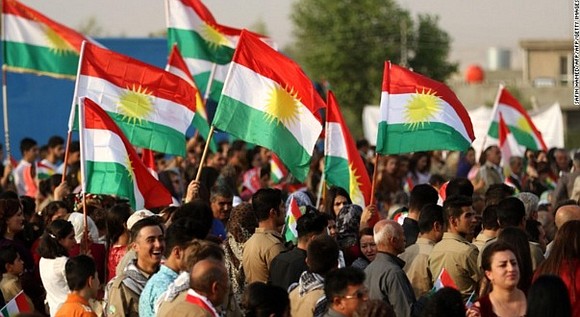Kirkuk: A Crisis Waiting to Happen, With Consequences for Region
CNN/Stylemagazine.com Newswire | 10/16/2017, 7:33 a.m.
By Tim Lister, CNN
(CNN) -- Two armies funded and trained by the United States are now facing off in northern Iraq, a confrontation that could have lasting consequences for the future of the country and the broader Middle East.
The Iraqi Security Forces and pro-Iranian Shia militia gathered south of the city of Kirkuk over the weekend after being ordered to seize infrastructure now under Kurdish control. According to Kurdish authorities, they attacked overnight along two fronts using Abrams tanks. By Monday morning there were reports of clashes on the edge of the city.
This confrontation always seemed likely, even inevitable. Not only does Kirkuk sit on one of Iraq's main ethnic and sectarian fault lines; it's also surrounded by some of the country's most valuable oil fields.
Referendum upped the stakes
The stakes were raised last month when the Kurdish leadership held an independence referendum in the face of international criticism and deep hostility from Baghdad. The decision to extend the vote to disputed areas such as Kirkuk, outside Iraqi Kurdistan's accepted borders, made a bad situation worse.
The city and its surroundings have long been a diverse area comprising Kurds, Arabs and Turkmen. Kurds returned to Kirkuk in huge numbers after the overthrow of Saddam Hussein, and further entrenched their control in 2014 when repelling ISIS advances.
Iraq's Constitutional Court ruled against the referendum, and Iraqi Prime Minister Haider al Abadi called it illegitimate. But the vote went ahead.
Abadi had the option of acquiescing and agreeing to negotiate Iraqi Kurdistan's long-term future, or refusing to accept the challenge it presented to Iraq's integrity. He chose the latter, no doubt under pressure from pro-Iranian Shia militia leaders who have long warned that Kirkuk is a red line.
US efforts to calm the situation have so far come to nought. Before the referendum the State Department urged Kurdish leaders "to accept a serious and sustained dialogue with the central government, facilitated by the United States and United Nations."
The Kurdistan Regional Government ignored the appeal in the belief the referendum would strengthen its hand in negotiations.
Clashes come days after Trump's Iran speech
Nor has the United States been able to prevail upon Baghdad to exercise restraint. It may be no accident that the advance on Kirkuk came three days after US President Donald Trump's speech on Iran and the designation of Iran's Islamic Revolutionary Guard Corps (IRGC) as a terrorist entity.
The Quds Force, an arm of the IRGC, is a powerful player in Iraq -- training and supplying Shia militia in the fight against ISIS. Its commander, Major General Qassem Suleimani, appears to spend as much time in Iraq as he does in Iran.
It would be rash to predict the course of these clashes. If Iraqi forces (and especially the predominantly Shia Popular Mobilization Units) make quick progress, they may be emboldened to roll back the Kurds north of Kirkuk. The Iraqi Counter Terrorism Services have said they have no intention of deploying into the city. They may have more limited goals: the seizure of oil fields and military facilities near the city.
The Iraqi military says a key airbase and power plant to the northwest of Kirkuk have already been taken, as well as oil facilities. To gain control over at least part of Kirkuk's half-million barrel daily oil output -- and the huge airbase on the city's western outskirts -- may be enough.
The Kurds are also hobbled by internal rifts, with reports that units loyal to one faction -- the Patriotic Union of Kurdistan -- refused to fight and withdrew from their divisions.
ISIS' defeat sets off turf wars
A deal to halt the fighting is possible, but the underlying tensions will not go away. The events of the last decade have persuaded many Kurds, especially the younger generation, that they have no future inside a weak and violent Iraq, and that Baghdad will always cheat the Kurds, one way or another.
Kurdish officials have always expected that post-ISIS larger conflicts would erupt. One senior commander told CNN two years ago that ISIS was no more than an irritant to the Kurds. What they really feared was expansionist Shia militia, well equipped and funded by Iran.
ISIS now faces the loss of the last scraps of territory it holds in Iraq and Syria, to a US-backed force in Raqqa, and to the Syrian army near the Iraqi border.
But its defeat is setting off multiple turf wars. For now, most of those are working out in Iran's favor.




